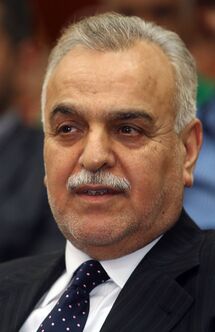Saleem Bousaid
Saleem Bousaid سليم بوسعيد | |
|---|---|
 Bousaid in 2018 | |
| President of the Caraq Union | |
| Assumed office 15 August 2006 | |
| Prime Minister | Najeeb Khawaja Zaahir el-Jamal |
| Vice President | Murshid al-Shaban Shujaa Vaziri Saabiq el-Khalifa Murad Karim |
| Preceded by | Zaki Bousaid Saleem Abdullah (acting) |
| Leader of the Caraqi Sahwanist Socialist Party | |
| Assumed office 15 August 2006 | |
| Deputy | Faris Munzur Zaahir el-Jamal |
| Preceded by | Saleem Abdullah |
| Personal details | |
| Born | Saleem Bousaid 5 December 1962 Dhul Kadad, Vierz West Oridia |
| Spouse | Karida Bousaid (m. 1990) |
| Children | 2 |
| Parent(s) | Fatima Bousaid Zaki Bousaid |
| Residence | Presidential Palace |
| Education | Vierz Al-Hattar School Imperial University of Kasenberg |
| Alma mater | University of Dhul Kadad |
| Military service | |
| Allegiance | |
| Branch/service | Caraq Union Air Force Caraq Union Armed Forces |
| Years of service | 1991–present |
| Rank | Marshal |
| Commands | Caraq Union Armed Forces |
| Battles/wars | Great Bakran War Caraqi Insurgency |
Saleem Bousaid (Caraqi: سليم بوسعيد Salīm Būsɛīd; born 5 December 1962) is a Caraqi politician who has been the President of the Caraq Union since 2006. He is the commander-in-chief of the Caraqi Armed Forces and the leader of the Caraqi Sahwanist Socialist Party. His father, Zaki Bousaid, was the President of Caraq from 1989 to 2006.
Born and raised in Dhul Kadad during the period of Vierz colonial rule, Bousaid attended the prestigious Vierz-language Al-Hattar School before continuing his studies at the Imperial University of Kasenberg. He dropped out and returned to Dhul Kadad, where he finished his university studies in philosophy. His father Zaki was involved in the Caraqi independence struggle and became president of the Caraq Union in 1989. Saleem joined the Caraq Union Air Force in 1991 and saw combat in the Great Bakran War. As the oldest son, he gradually became the heir apparent to his father, who he replaced as president of Caraq and leader of the Caraqi Sahwanist Socialist Party in 2006.
Most classify Bousaid's regime as a repressive, personalist, and corrupt dictatorship. Bousaid is regularly accused of inflaming ethnic and religious tensions in both Caraq and the region at-large. He and his family are the objects of a pervasive cult of personality that depicts them as the saviours of the Caraqi-speaking world and as a necessary bulwark against Western imperialism. Bousaid and his supporters are orthodox followers of Sahwanist ideology, which promotes secularism, Caraqi nationalism, and socialism.